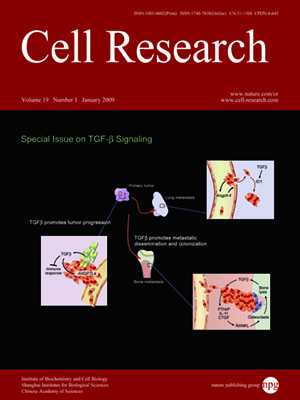
Volume 19, No 1, Jan 2009
ISSN: 1001-0602
EISSN: 1748-7838 2018
impact factor 17.848*
(Clarivate Analytics, 2019)
Volume 19 Issue 1, January 2009: 8-20
REVIEWS
Phospho-control of TGF-β superfamily signaling
Katharine H Wrighton, Xia Lin1 and Xin-Hua Feng
Michael E. DeBakey Department of Surgery, Department of Molecular & Cellular Biology and Dan L. Duncan Cancer Center, Baylor College of Medicine, Houston, TX 77030, USA
Correspondence: Xin-Hua Feng,(xfeng@bcm.edu )
Members of the transforming growth factor-β (TGF-β) family control a broad range of cellular responses in metazoan organisms via autocrine, paracrine, and endocrine modes. Thus, aberrant TGF-β signaling can play a key role in the pathogenesis of several diseases, including cancer. TGF-β signaling pathways are activated by a short phospho-cascade, from receptor phosphorylation to the subsequent phosphorylation and activation of downstream signal transducers called R-Smads. R-Smad phosphorylation state determines Smad complex assembly/disassembly, nuclear import/export, transcriptional activity and stability, and is thus the most critical event in TGF-β signaling. Dephosphorylation of R-Smads by specific phosphatases prevents or terminates TGF-β signaling, highlighting the need to consider Smad (de)phosphorylation as a tightly controlled and dynamic event. This article illustrates the essential roles of reversible phosphorylation in controlling the strength and duration of TGF-β signaling and the ensuing physiological responses.
Cell Research (2009) 19:1-2. doi: 10.1038/cr.2009.3; published online 5 January 2009
FULL TEXT | PDF
Browse 2000


